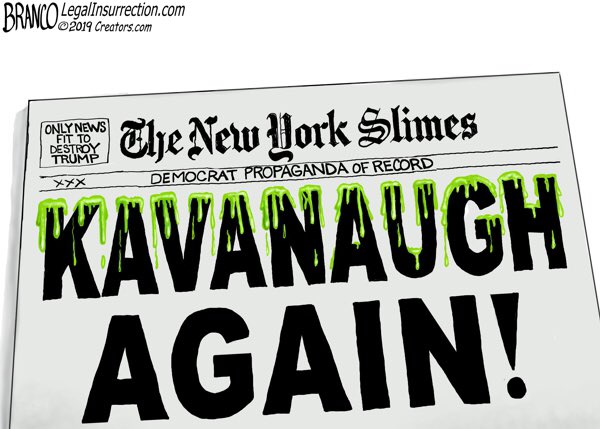Turns out the Kavanaugh smear from last week was set up by Robin Pogrebin, one of the two hacks pimping a Kavanaugh smearing book. According to The Federalist, Robin Pogrebin told a source what to say and by asking sources to confirm information she herself had given them. That’s what’s considered “journalism” for the New York Time and left wing media propaganda outfits these days. SCOTUS Justice Kavanaugh and the “anonymous woman” who was outed in this left wing propaganda and smear book really need to sue Pogrebin and the New York Times.
| New York Times hack Robin Pogrebin told anonymous source what to say about Kavanaugh |
|---|

|
Year-old texts contained in a Senate Judiciary Committee report show that New York Times reporter Robin Pogrebin engaged in questionable journalistic tactics to shape a false narrative against Kavanaugh by telling a source what to say and by asking sources to confirm information she herself had given them. And despite including a highly opinionated discussion of the text exchange in their book, the authors never admitted that Pogrebin was a key player in the exchanges.
Pogrebin made a bizarre and unsupported claim this week that Supreme Court Justice Brett Kavanaugh had told her to lie. It turned out Pogrebin had mischaracterized discussions with the Supreme Court’s public information officer, not Kavanaugh, who had merely explained the terms of an off-the-record interview that was being sought and never obtained. Despite the many errors and false claims Pogrebin and her co-author Kate Kelly made, corporate media picked up on this false statement as if it were true.
A 2018 text exchange between Karen Yarasavage and Kerry Berchem shows them discussing Deborah Ramirez’s claim against Kavanaugh. Yarasavage was extremely close to Ramirez — having asked Ramirez to be a godmother to one of her children — and knew Kavanaugh well, too. Berchem was younger and not at Yale when the alleged incident was said to have taken place. While in reality, the text exchanges show Berchem trying to get Yarasavage to say something supportive of Ramirez’s claim, even though Yarasavage said she’d never even heard of any such incident and felt confident she would have if it had happened, the media characterized the discussions as evidence of Kavanaugh’s guilt.
In their book, Pogrebin and Kelly continue the media narrative that the exchanges were the opposite of what they were. They write that discussions of media inquiries to find anti-Kavanaugh dirt in the summer instead “raised questions as to whether Kavanaugh and his friends or representatives had been trying to influence events as far back as July.” The exchanges “had started with seemingly innocent social contacts, but — in the context of the Ford and Ramirez allegations — they had taken on importance as potentially relevant material to show the FBI.”